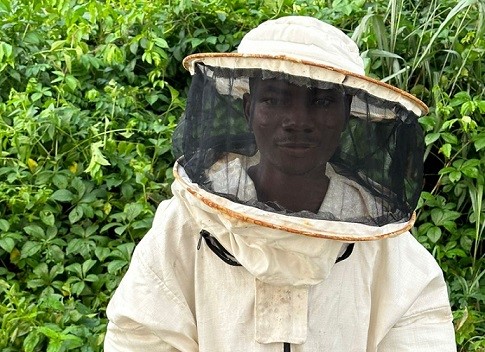Bee Keeping
Being a beekeeper requires some simple practices and precautions to ensure the safety of both the bees and the beekeeper. Here are some of the key ones:1. Knowledge and Research: Before getting started with beekeeping, it is important to educate yourself about the basic principles of beekeeping, including bee behavior, hive maintenance, and disease prevention. Research and learn from experienced beekeepers or take courses to acquire the necessary knowledge.
2. Protective Clothing: When working with bees, it is crucial to wear proper protective clothing. This typically includes a beekeeping suit or jacket with attached veil, gloves, and closed-toe shoes. The clothing should be light-colored and made of sturdy material to provide protection against bee stings.
3. Smoker: A smoker is an essential tool used in beekeeping to calm the bees. It emits smoke that triggers a response from the bees, making them think the hive is on fire. This prompts the bees to gorge on honey, making them less aggressive and easier to work with.
4. Gentle Approach: Beekeepers must handle the bees with care and demonstrate a gentle approach. Quick and sudden movements can agitate the bees, leading to stings. Slow, deliberate movements help keep the bees calm.
5. Regular Hive Inspections: Regular inspections of the hive are necessary to ensure the health and well-being of the colony. These inspections help identify any signs of disease, pests, or issues with the hive structure. Inspections should be conducted during warm and calm weather.
6. Pest and Disease Control: Beekeepers need to be vigilant against pests and diseases that can harm the hive. This may involve strategies such as regular mite treatments, monitoring for signs of diseases, and taking appropriate measures to prevent or mitigate infestations.
7. Respect and Awareness: Beekeepers need to be aware of their surroundings and the behavior of the bees. They should consider the needs of the bees before taking any action and always treat the bees with respect.
8. Protective Measures: Beekeepers should take precautions to prevent accidental stings. This may include placing the hive in a location away from high-traffic areas, using fencing or barriers to guide the bee flight path, and keeping the hive secure to prevent pests or animals from causing disturbances.
9. Water Source: Bees require water for their survival, so beekeepers must provide a suitable water source near the hive. This can be a shallow water container with rocks, twigs, or floating objects to prevent the bees from drowning.
10. Continuing Education: Beekeeping practices and information can evolve, so it's important for beekeepers to stay updated by participating in workshops, conferences, and engaging with the beekeeping community. Ongoing education helps ensure that beekeeping practices align with the latest knowledge and techniques.
By following these practices and precautions, beekeepers can maintain healthy and thriving hives while minimizing the risks.
Economic benefits of Bee Keeping
Beekeeping has several economic benefits and importance. Here are some key points:1. Honey Production: Honey is one of the primary products of beekeeping and has significant economic value. It is a versatile product used in various industries, including food and beverage, healthcare, and cosmetics. Beekeepers can harvest and sell honey, generating a source of income.
2. Pollination Services: Bees are crucial pollinators that play a vital role in the reproduction of many flowering plants. Beekeepers can offer their hives for pollination services to agricultural farmers. These services help increase crop yields and quality, resulting in improved agricultural productivity and profitability.
3. Crop Diversification: Beekeeping allows for crop diversification by enabling the production of specialty or high-value crops that rely on bee pollination. This includes crops such as almonds, apples, berries, and melons. Beekeepers can benefit from producing honey while contributing to the agricultural sector.
4. Value-Added Products: Besides honey, beekeeping can provide opportunities for the production of value-added products, such as beeswax, propolis, pollen, and royal jelly. These products have various applications in industries like cosmetics, healthcare, candles, and food supplements, presenting additional sources of income for beekeepers.
5. Job Creation and Rural Development: Beekeeping can stimulate job creation and contribute to rural development, especially in areas with suitable ecological conditions for beekeeping. It can provide livelihood opportunities for beekeepers, honey processors, marketers, equipment manufacturers, and other related service providers.
6. Environmental Benefits: Beekeeping promotes environmental conservation and biodiversity by supporting the pollination of wild plants. This contributes to the overall health and diversity of ecosystems, allowing for sustainable agriculture and natural habitats.
7. Tourism and Education: Beekeeping can attract tourists and visitors, especially in areas where it is practiced on a larger scale. Beekeeping farms and apiaries provide educational and recreational opportunities, offering guided tours, beekeeping workshops, and honey tasting experiences.
8. Sustainable Business: Beekeeping is a relatively low-cost and sustainable business that requires minimal land and resources. It can be practiced on a small scale, allowing individuals or families to start and operate beekeeping businesses without significant upfront investments.
9. Climate Resilience: Beekeeping can contribute to building climate resilience as bees are adaptable pollinators that can thrive in various climatic conditions. Diversifying income sources through beekeeping can provide a buffer against climate-related risks and fluctuations in other agricultural sectors.
Overall, beekeeping presents various economic opportunities and benefits, ranging from honey production to pollination services, value-added products, job creation, and environmental conservation. It can be a sustainable and rewarding agribusiness venture with positive impacts on both the local economy and the natural environment.

